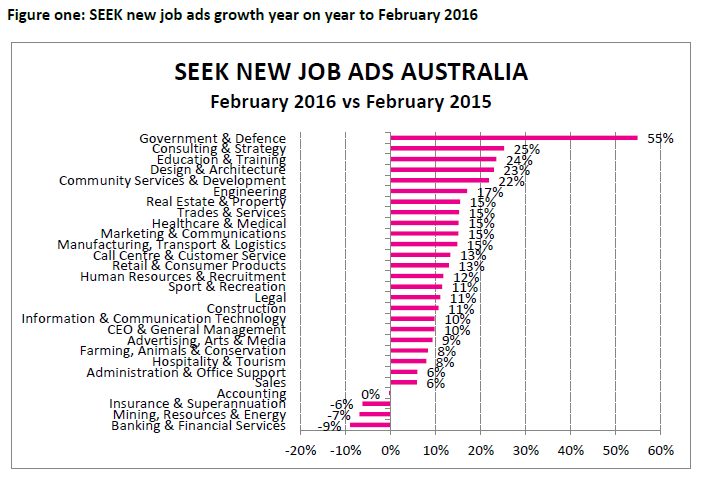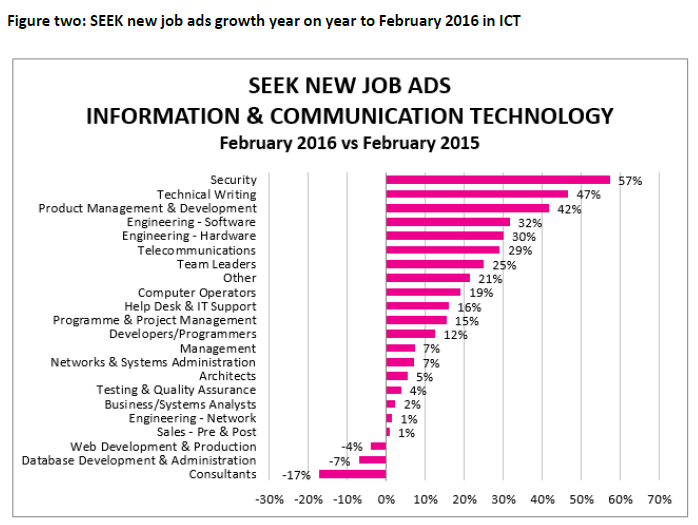 New job ads in Information & Communication Technology sector fuelled by strength of eastern states
New job ads in Information & Communication Technology sector fuelled by strength of eastern states
SEEK new job ads in February 2016 are up 5.7 per cent compared to the same time last year
Growth in eastern states continues to offset declines in the west
Latest data from SEEK shows the number of new job ads increased 5.7 per cent from February 2015 year on year to February 2016. Buoying this increase are the eastern states, which show strong year on year growth. The two largest employing states New South Wales and Victoria are up 11.6 per cent and 6.8 per cent. Queensland has shown promising signs of recovering from the mining down turn with new job ads up 3.9 per cent over the 12 months and South Australia is up 7.7 per cent. Tasmania and ACT also posted strong year on year growth, up 10.7 per cent and 26.3 per cent respectively.
SEEK Employment Managing Director, Michael Ilczynski said “It is encouraging to see strong year on year growth across almost all states and territories in Australia and also that the growth is driven through a wide variety of industries. 24 out of 28 industries on SEEK experienced increases in job advertising over the past 12 months.”

INDUSTRY FOCUS: INFORMATION & COMMUNICATION TECHNOLOGY SECTOR
The Information & Communications Technology (ICT) industry remains strong nationwide, experiencing 10 per cent year on year growth to February 2016.
SEEK Employment Managing Director, Michael Ilczynski said that, at a state level, the growth in job ads in the ICT sector reflects the overall health of the employment market nationwide.
“Tasmania, Victoria and Queensland, ACT and New South Wales all experienced double digit growth in ICT job ads. New South Wales which has the largest number of opportunities advertised increased by 10 per cent year on year. There are now over 7,500 ICT jobs advertised through New South Wales, which is fantastic for those looking for work in that industry.”
Given the challenging employment market in Western Australia it is not surprising to see ICT roles declined year on year.
“We are not surprised to see that given the tough environment Western Australian businesses are facing as a result of the pull-back in mining investment that job opportunities in IT have gone down. It’s likely that businesses don’t have the resources to go ahead with new IT infrastructures or projects, which is having a direct reflection on their hiring needs” commented Mr Ilczynski.
At a national level there has been extremely strong year on year growth in demand for IT Security professionals (57 per cent), Technical Writers – those who produce easily accessible and digestible content for printed and online documents, such as user guides, manuals, intranet and website pages – (47 per cent) and Product Managers and Developers (42 per cent).
According to Mark Nielsen, APAC CEO of global IT recruitment specialist Talent International, the increase in IT security job listings can be attributed to sophisticated artificial intelligence and the unprecedented uptake of cloud computing over the past 12 months by Australian businesses, fuelling a demand for specialists to keep networks secure.
“With businesses expanding their offerings to meet customer web and mobility requirements, coupled with the advancement in devices with artificial intelligence capabilities, it is now more important than ever to be able to anticipate the level of sophistication possible when it comes to cybercrimes. There has been a significant increase in the way governments, businesses and people rely on technology and mobility as well as the rapid expansion of cloud computing, and as a result, IT security is one of the fastest growing areas we are seeing in the industry today.”

STATE BY STATE
New jobs advertised remained relatively stable month to month dipping just 0.8 per cent from January to February 2016.
According to Mr Ilczynski, this slight loss in national momentum is primarily driven by the further downturn in advertising in Western Australia, where job ads fell 5.6 per cent month on month in February 2016 to be 20.1 per cent lower than a year ago.
“The decline in job advertising in Western Australia is across multiple industries and we are seeing a rise in applications for each job advertised in the State. This gives us an indication that the unemployment rate for the State is not likely to improve in the short-term,” said Mr Ilczynski.
Month on month advertising dipped in four other states and territories in February, including slight decreases in New South Wales (down 0.5 per cent) and Victoria (down 0.7 per cent). Advertising also fell in Queensland by 2.2 per cent; while increases were seen in South Australia (up 2.4 per cent), Tasmania (up 1.1 per cent) and Northern Territory (up 0.7 per cent).
SEEK EMPLOYMENT INDEX
The SEEK Employment Index (SEI), a measure of the availability of candidates for job advertisements, dropped four per cent month on month in February 2016, but remained 1.1 per cent higher than a year ago.
In trend terms, the SEI has fallen slightly in the past five months, continuing to suggest a weakening labour market for candidates, and a stronger volume of applications for every job which is posted on SEEK. This is particularly apparent across the Northern Territory, Western Australia, Tasmania and South Australia.
About SEEK
SEEK is a diverse group of companies, comprised of a strong portfolio of online employment, educational, commercial and volunteer businesses. SEEK operates across 19 countries with exposure to over 4 billion people and 28 per cent of GDP. SEEK makes a positive contribution to people’s lives on a global scale. SEEK is listed on the Australian Securities Exchange, where it is a top 50 company with a market capitalisation close to A$6billion and has been listed in the Top 20 Most Innovative Companies Globally by Forbes, and Number One in Australia. For 18 years SEEK has been an integral part of Australians’ job-search process, and as the country’s leading employment marketplace is uniquely positioned to empower Australians with career, education and volunteer opportunities to create productive and fulfilling working lives.


